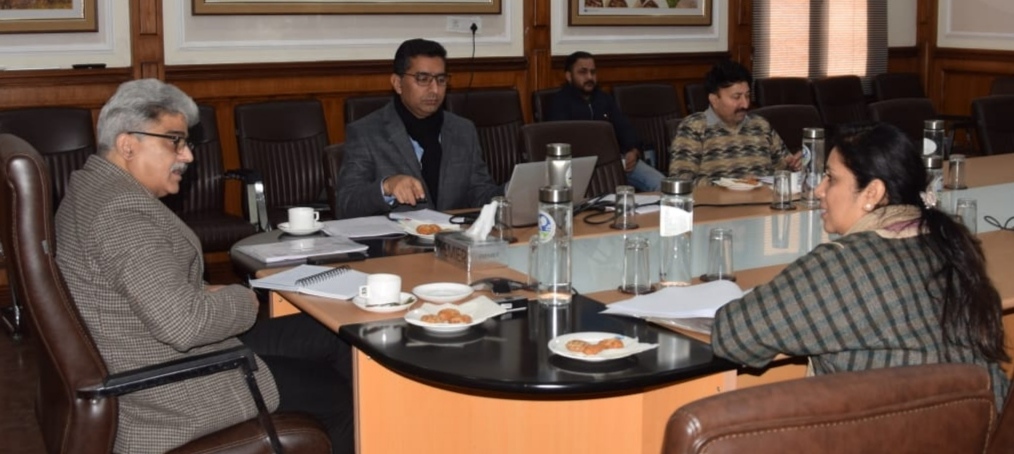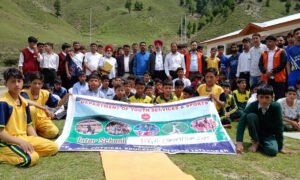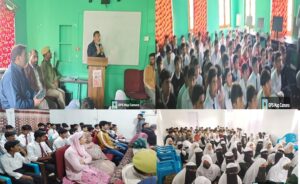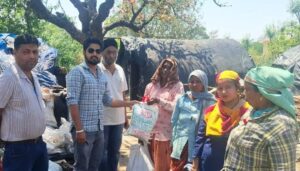CS for ensuring functionality of assets created for rural sanitation
Also reviews the plan for carbon neutrality of panchayats here

Also reviews the plan for carbon neutrality of panchayats here
JAMMU, JANUARY 18: Chief Secretary, Atal Dulloo today while reviewing the updated scenario of Swachh Bharat Mission-Grameen (SBM-G) here impressed upon the concerned authorities to carry out frequent field visits to the nook and corner of the UT for having first hand appraisal about the utility and functional status of the assets created for sanitation of rural areas.
The meeting was attended by Secretary, RDD; DG, Rural Sanitation besides other concerned officers of the Department.
While taking cognizance of the status of door to door collection of waste in rural areas the Chief Secretary emphasized upon adopting sustainable models keeping in view the significance of this national mission. He maintained that after achieving the status of ODF+ Model category for the UT, it is imperative to maintain it without any slackness creeping in our approach.
He advised to conduct a study of all the assets created across the villages of the UT to evaluate their utilisation in their respective areas. He stressed on their proper upkeep and maintenance for their operational readiness round the year. He urged the department to evolve a roadmap to receive the real time information about the utility of these assets in these villages.
Dulloo ensured the concerned that the LG administration would extend every possible assistance in maintenance of these rural assets. He asked them to come up with a suitable plan for their optimum use and operation to make sanitation a hallmark of our villages here.
Regarding the promulgation and execution of carbon neutral plan for the panchayats of the UT as envisioned by the Prime Minister, the Chief Secretary upheld that interdepartmental coordination and synergy should be shown to make it successful. He also encouraged them to conduct the survey of the villages by experts to estimate the carbon these villages produce and the possible remedial measures to be taken there.
In his presentation the Secretary, Rural Development Department, Shahid Iqbal Choudhury gave an in-depth description of the measures and achievements registered by the department in implementation of the mission. He revealed that all the 6650 villages of the UT have been declared ODF+ in August last year after complying with the guidelines for the same.
He further apprised the meeting that both the Solid Waste and Liquid Waste Management in these villages have been upgraded and drainage facilities provided to the villages either. It was revealed that a total of 2,36,137 SWM assets, 923331 assets for Grey Water Management (GWM), 80 Plastic Waste Management Units (PWMU), 7 Faecal Sludge Treatment Plants and 3 Gobar Dhan Plants including 17,20,765 individual household latrines (IHHLs) have been raised by the department in rural areas.
Moreover it was given out that the department has created 28,077 IHHLs and 565 CSCs as per the demand from districts during current financial year. It was informed in the meeting that the department is in a process of establishing 8 Gobar Dhan Biogas plants in the UT besides completing 76 more PWMUs which would take the tally to 218 blocks for taking care of the plastic waste generated there.
While discussing the carbon neutral panchayat project it was said that the energy emission format was prepared in coordination with the Department of Environment, Ecology and Remote Sensing with inputs from IIT Delhi, IIT Jammu, Kashmir University, and Jammu University. In addition the pilot project for declaring Palli in district Samba a Carbon Neutral Panchayat was also discussed.
It was said that this Panchayat has been provided with 10 Biogas plants, 1 Govardhan plant, distribution of solar cookers, planting 25000 trees, introduction of organic farming, constructing an Amrit Sarovar, organising catch the rain campaign, crop diversification and other clean energy measures had been initiated by the department there in convergence with others.
Further the finalization of Energy Emission Template for other panchayats, development of an online portal for conducting surveys based on energy Emission format, Capacity Building of field functionaries under RGSA for conducting the surveys, calculations of Emissions and formulations of panchayat wise carbon neutral plans were also discussed in this meeting.






